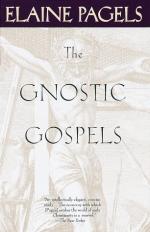
|
| Name: _________________________ | Period: ___________________ |
This quiz consists of 5 multiple choice and 5 short answer questions through Chapter 3.
Multiple Choice Questions
1. Some Gnostic authors see Sophia as the ___________ benevolently having provided the gift of self-awareness to Adam and to Eve.
(a) Tree.
(b) Serpent.
(c) Goddess.
(d) Apple.
2. Where did members of the Egyptian government eventually spot the papyri that Muhammed had given away?
(a) Black market.
(b) Coptic museum.
(c) Temple.
(d) The library.
3. Pagels points out that it was __________ that ultimately expelled the Valentinians who strove to maintain their membership.
(a) The Church.
(b) The Jews.
(c) The Gnostics.
(d) The Romans.
4. There is some speculation that the use of ________ was used in order to indicate that God was both Male and Female.
(a) They.
(b) I.
(c) We.
(d) All.
5. What did Muhammad and his brothers embark on in order to avenge the death of their father?
(a) Ritual.
(b) Quest.
(c) Blood feud.
(d) Funeral procession.
Short Answer Questions
1. What did Muhammed not want to do when he first found the jar during the dig with his brothers?
2. Marion concluded that there were ___________ because of the brutal God in the Old Testament and the compassionate God in the New Testament.
3. Tertullian was against the heretics that embraced the followings of Jesus, but who also denied the idea of _______________.
4. How many leather bound papyri were in the jar when Muhammed finally broke it open with his knife?
5. Tertullian wrote: "...this flesh, suffused with blood, built up with bones, interwoven with nerves.....was born and dies, undoubtedly _________."
|
This section contains 249 words (approx. 1 page at 300 words per page) |

|




